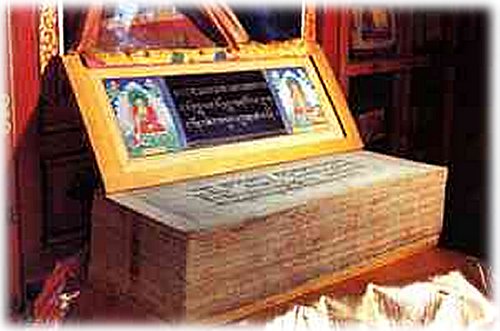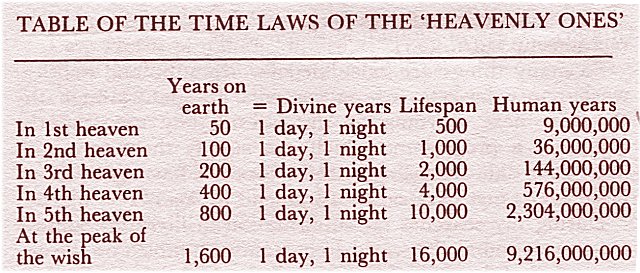Kantyua And Tantyua – Sacred Tibetan Books Reveal Incredible Lifespan Of The Gods
A. Sutherland - AncientPages.com - The very ancient and mysterious Tibetan books "Kantyua and Tantyua" are a treasury of sacred wisdom and a cornerstone of Tibetan civilization.
Kantyua consists 108 folio volumes and 9 sections with 1083 books, as one book and Tantyua with its 225 volumes, is a commentary on it. Both sacred scriptures, carved on Chinese wooden blocks, take up so much room that they were kept hidden in the cellars of many houses in several villages in Tibetan mountain valleys.
Their date of origin is unknown.
Sacred Scripts in the Kumbum Monastery
In one of the Kantyua books entitled Collection of the Six Voices and chapter 'Divine Voices' is written: "There are different heavens and these heavens are not open to all divinities. However numerous the gods may be, they can never transgress the three fundamental laws, which are: the domain of the wish, the domain with extension, the domain without the extension. These three laws are divided into subsections. There are 28 dwelling places altogether. The region of the wish has six..."
The sacred books describe different regions and their rulers and also different divine years in comparison with human years years are given for each region.
"In the heaven of the four Great Kings 50 terrestrial years correspond to a day and a night. The lifespan is 500 years, or nine million years if one counts in terrestrial years.
Above the heaven of the four Kings we reach the second heavenly dwelling place... In this heaven 100 years among men count as a day a night. The lifespan is 1000 years. If that is reckoned in human years, it is 36000 x 10000 years or 36 million years...
See also:
“Thogcha” – Thousand-Year-Old Tibetan Amulets And The Bon Culture
Phurba Dagger: Magical Weapon That Restrains Evil And Harmful Occult Forces
Yama – Hindu God Who Rules Over The Dead And Souls And Guards Akashic Records
After this heaven there is a place, which resembles many clouds and has the seven treasures, like a great earth. 200 terrestrial days corresponds to a day and a night for the gods.
Their lifespan is 2000 years, which means 144 million (!) human years.
Another heaven described in the chapter "Divine Voices" is the dwelling place of Tusita.
The city of the Tusitas is the most beautiful and venerable of all the celestial worlds. Among the gods living there, 400 human years correspond to a day and a night.
The lifespan of Tusita's gods is 4000 years, which means 576 million years in human years...
After the world of the gods of Tusita... is the fifth dwelling place, where the gods are able to transform themselves and possess the five elements... Among these gods 800 human years correspond to a day and a night.
Their lifespan is 10000 years, which means two billion 304 million years counted in human years....
After the fifth heaven, there is the sixth residence, where the gods are able to transform everything and for their pleasure they have gardens, woods, castles and palaces, and everything they desire.
This place is the peak of the region of the wish. Among these gods 16000 human years correspond to a day and a night. Their lifespan is 16000 years, or 9 billion 216 million years expressed in human years."
Of course, the Kantyua and Tantyua are not the only ancient records mentioning extraordinary lifespans of the gods. The Sumerian King List, found in the temple library of Nippur, ancient city of Mesopotamia, now in southeastern Iraq informs that before the Great Flood there were five cities and eight kings who reigned 241,200 years!
Written by – A. Sutherland AncientPages.com Staff Writer
Copyright © AncientPages.com All rights reserved. This material may not be published, broadcast, rewritten or redistributed in whole or part without the express written permission of AncientPages.com
More From Ancient Pages
-
 Unexplained Encounters: Beings With Inhuman Eyes – A Darker Side Of Humanity Or Groundless Worries?
Featured Stories | Mar 2, 2025
Unexplained Encounters: Beings With Inhuman Eyes – A Darker Side Of Humanity Or Groundless Worries?
Featured Stories | Mar 2, 2025 -
 Aqrabuamelu – Mysterious Scorpion Men In Babylonian Mythology
Featured Stories | Jan 19, 2016
Aqrabuamelu – Mysterious Scorpion Men In Babylonian Mythology
Featured Stories | Jan 19, 2016 -
 Denisovan Family Tree: New Branches Revealed In Ancient DNA
Archaeology | Apr 12, 2019
Denisovan Family Tree: New Branches Revealed In Ancient DNA
Archaeology | Apr 12, 2019 -
 Has The Mystery Of The Secret Sarcophagus Found At Notre-Dame Cathedral Been Solved?
Archaeology | Sep 25, 2024
Has The Mystery Of The Secret Sarcophagus Found At Notre-Dame Cathedral Been Solved?
Archaeology | Sep 25, 2024 -
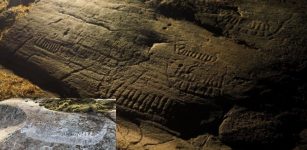 Ancient Petroglyph Code Cracked By Archaeological Explorers
News | Apr 10, 2020
Ancient Petroglyph Code Cracked By Archaeological Explorers
News | Apr 10, 2020 -
 Rare Bronze Seal Matrix Of St. George Slaying The Dragon Discovered In French Castle
Archaeology | Mar 22, 2022
Rare Bronze Seal Matrix Of St. George Slaying The Dragon Discovered In French Castle
Archaeology | Mar 22, 2022 -
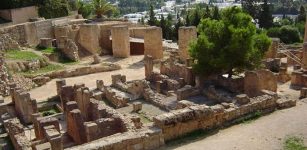 Carthage: Prosperous Phoenician Colony That Became Dominant Power In The Western Mediterranean
Featured Stories | May 21, 2020
Carthage: Prosperous Phoenician Colony That Became Dominant Power In The Western Mediterranean
Featured Stories | May 21, 2020 -
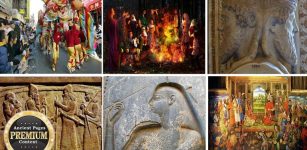 Ancient History Of New Year’s Celebrations And Traditions From Around The World
Ancient Traditions And Customs | Dec 31, 2024
Ancient History Of New Year’s Celebrations And Traditions From Around The World
Ancient Traditions And Customs | Dec 31, 2024 -
 Enigmatic Voynich Manuscript: Computer Scientists From Alberta Use AI To Decipher Document
Archaeology | Jan 31, 2018
Enigmatic Voynich Manuscript: Computer Scientists From Alberta Use AI To Decipher Document
Archaeology | Jan 31, 2018 -
 Ancient Enigma Of Mercator’s Amazing Map
Ancient Technology | May 4, 2015
Ancient Enigma Of Mercator’s Amazing Map
Ancient Technology | May 4, 2015 -
 Gallic Leader Vercingetorix In Victorious Battle Of Gergovia, 52 BC
Featured Stories | Jan 23, 2017
Gallic Leader Vercingetorix In Victorious Battle Of Gergovia, 52 BC
Featured Stories | Jan 23, 2017 -
 Colosseum-Like Structure Unearthed In 2700-Year-Old Ancient City Of Mastaura
Archaeology | Aug 22, 2020
Colosseum-Like Structure Unearthed In 2700-Year-Old Ancient City Of Mastaura
Archaeology | Aug 22, 2020 -
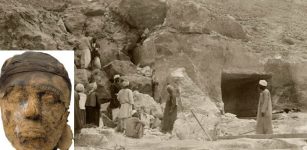 Mystery Of Egyptian Tomb 10A And The Mummy’s Head – A 4,000-Year-Old Crime
Featured Stories | Apr 27, 2022
Mystery Of Egyptian Tomb 10A And The Mummy’s Head – A 4,000-Year-Old Crime
Featured Stories | Apr 27, 2022 -
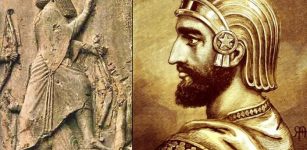 Murder Of Bardiya: Son Of Cyrus The Great And The Riddle Of The Impostor
Historical Figures | Dec 7, 2018
Murder Of Bardiya: Son Of Cyrus The Great And The Riddle Of The Impostor
Historical Figures | Dec 7, 2018 -
 Unexplained Phenomena In Arkansas – Old Mysteries Still Puzzling The Modern World
Featured Stories | Jan 9, 2019
Unexplained Phenomena In Arkansas – Old Mysteries Still Puzzling The Modern World
Featured Stories | Jan 9, 2019 -
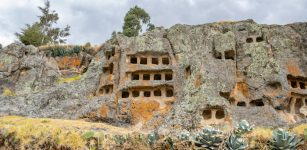 Fascinating Artificial Caves Of Ventanillas de Otuzco And Its Secret Passageways – Pre-Inca Necropolis Of The Cajamarca Culture
Featured Stories | Feb 5, 2022
Fascinating Artificial Caves Of Ventanillas de Otuzco And Its Secret Passageways – Pre-Inca Necropolis Of The Cajamarca Culture
Featured Stories | Feb 5, 2022 -
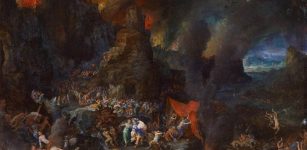 Hades – Land Of The Dead In Greek Beliefs Offered Punishment And Paradise Full Of Harmony
Featured Stories | Aug 15, 2019
Hades – Land Of The Dead In Greek Beliefs Offered Punishment And Paradise Full Of Harmony
Featured Stories | Aug 15, 2019 -
 Were The Viking Berserkers True Or Drug Addicted Warriors Fighting In Trance?
Featured Stories | Feb 3, 2015
Were The Viking Berserkers True Or Drug Addicted Warriors Fighting In Trance?
Featured Stories | Feb 3, 2015 -
 Oldest Known Projectile Points In The Americas Discovered In Idaho
Archaeology | Dec 23, 2022
Oldest Known Projectile Points In The Americas Discovered In Idaho
Archaeology | Dec 23, 2022 -
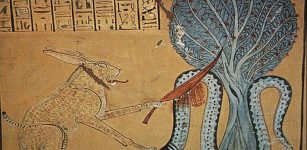 Malignant Serpent God Apophis: Symbol Of Chaos And Forces Of Darkness
Ancient Symbols | Oct 13, 2016
Malignant Serpent God Apophis: Symbol Of Chaos And Forces Of Darkness
Ancient Symbols | Oct 13, 2016

